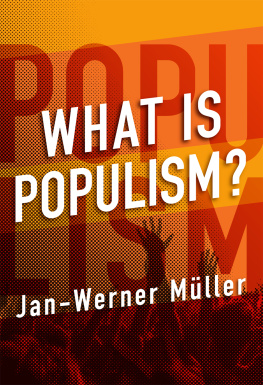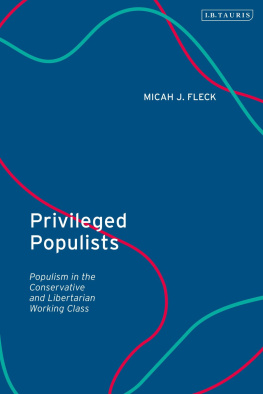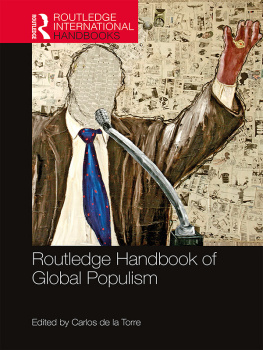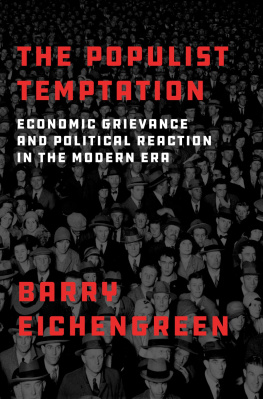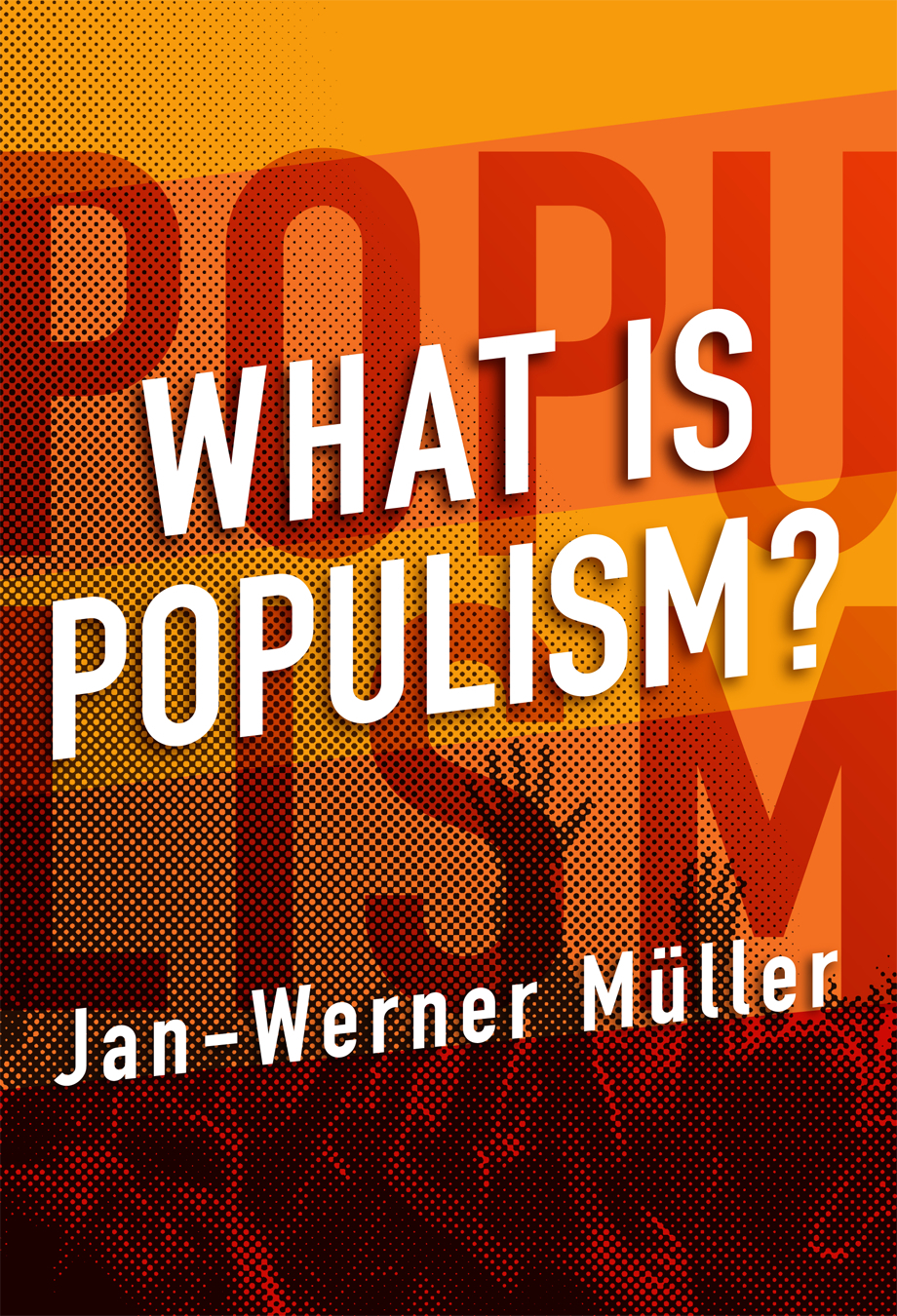
What Is Populism?
What Is Populism?
Jan-Werner Mller

UNIVERSITY OF PENNSYLVANIA PRESS
PHILADELPHIA
Copyright 2016 University of Pennsylvania Press
All rights reserved. Except for brief quotations used for purposes of review or scholarly citation, none of this book may be reproduced in any form by any means without written permission from the publisher.
Published by
University of Pennsylvania Press
Philadelphia, Pennsylvania 19104-4112
www.upenn.edu/pennpress
A Cataloging-in-Publication record is available from the Library of Congress
Cover design by Bradford Foltz
ISBN 978-0-8122-4898-2 hardcover
ISBN 978-0-8122-9378-4 e-book
The only meaning I can see in the word people is mixture; if you substitute for the word people the words number and mixture, you will get some very odd terms... the sovereign mixture, the will of the mixture, etc.
Paul Valry
All power comes from the people. But where does it go?
Bertolt Brecht
Contents
Is Everyone a Populist?
No US election campaign in living memory has seen as many invocations of populism as the one unfolding in 201516. Both Donald Trump and Bernie Sanders have been labelled populists. The term is regularly used as a synonym for antiestablishment, irrespective, it seems, of any particular political ideas; content, as opposed to attitude, simply doesnt seem to matter. The term is thus also primarily associated with particular moods and emotions: populists are angry; their voters are frustrated or suffer from resentment. Similar claims are made about political leaders in Europe and their followers: Marine Le Pen and Geert Wilders, for instance, are commonly referred to as populists. Both these politicians are clearly on the right. But, as with the Sanders phenomenon, left-wing insurgents are also labeled populists: there is Syriza in Greece, a left-wing alliance that came to power in January 2015, and Podemos in Spain, which shares with Syriza a fundamental opposition to Angela Merkels austerity policies in response to the Eurocrisis. Bothespecially Podemosmake a point of feeling inspired by what is commonly referred to as the pink tide in Latin America: the success of populist leaders such as Rafael Correa, Evo Morales, and, above all, Hugo Chvez. Yet what do all these political actors actually have in common? If we hold with Hannah Arendt that political judgment is the capacity to draw proper distinctions, the widespread conflation of right and left when talking about populism should give us pause. Might the popularity of diagnosing all kinds of different phenomena as populism be a failure of political judgment?
This book starts with the observation that, for all the talk about populismthe Bulgarian political scientist Ivan Krastev, one of the sharpest analysts of democratic life today, has even called our time an Age of Populismit is far from obvious that we know what we are talking about. We simply do not have anything like a theory of populism, and we seem to lack coherent criteria for deciding when political actors turn populist in some meaningful sense. After all, every politicianespecially in poll-driven democracieswants to appeal to the people, all want to tell a story that can be understood by as many citizens as possible, all want to be sensitive to how ordinary folks think and, in particular, feel. Might a populist simply be a successful politician one doesnt like? Can the charge populism perhaps itself be populist? Or might, in the end, populism actually be the authentic voice of democracy, as Christopher Lasch maintained?
This book seeks to help us recognize and deal with populism. It aims to do so in three ways. First, I want to give an account of what kind of political actor qualifies as populist. I argue that it is a necessary but not sufficient condition to be critical of elites in order to count as a populist. Otherwise, anyone criticizing the status quo in, for instance, Greece, Italy, or the United States would by definition be a populistand, whatever else one thinks about Syriza, Beppe Grillos insurgent Five Star Movement, or Sanders, for that matter, its hard to deny that their attacks on elites can often be justified. Also, virtually every presidential candidate in the United States would be a populist, if criticism of existing elites is all there is to populism: everyone, after all, runs against Washington.
In addition to being antielitist, populists are always antipluralist. Populists claim that they, and they alone, represent the people. Think, for instance, of Turkish President Recep Tayyip Erdoan declaring at a party congress in defiance of his numerous domestic critics, We are the people. Who are you? Of course, he knew that his opponents were Turks, too. The claim to exclusive representation is not an empirical one; it is always distinctly moral. When running for office, populists portray their political competitors as part of the immoral, corrupt elite; when ruling, they refuse to recognize any opposition as legitimate. The populist logic also implies that whoever does not support populist parties might not be a proper part of the peoplealways defined as righteous and morally pure. Put simply, populists do not claim We are the 99 percent. What they imply instead is We are the 100 percent.
For populists, this equation always works out: any remainder can be dismissed as immoral and not properly a part of the people at all. Thats another way of saying that populism is always a form of identity politics (though not all versions of identity politics are populist). What follows from this understanding of populism as an exclusionary form of identity politics is that populism tends to pose a danger to democracy. For democracy requires pluralism and the recognition that we need to find fair terms of living together as free, equal, but also irreducibly diverse citizens. The idea of the single, homogeneous, authentic people is a fantasy; as the philosopher Jrgen Habermas once put it, the people can only appear in the plural. And its a dangerous fantasy, because populists do not just thrive on conflict and encourage polarization; they also treat their political opponents as enemies of the people and seek to exclude them altogether.
This is not to say that all populists will send their enemies to a gulag or build walls along the countrys borders, but neither is populism limited to harmless campaign rhetoric or a mere protest that burns out as soon as a populist wins power. Populists can govern as populists. This goes against the conventional wisdom, which holds that populist protest parties cancel themselves out once they win an election, since by definition one cannot protest against oneself in government. Populist governance exhibits three features: attempts to hijack the state apparatus, corruption and mass clientelism (trading material benefits or bureaucratic favors for political support by citizens who become the populists clients), and efforts systematically to suppress civil society. Of course, many authoritarians will do similar things. The difference is that populists justify their conduct by claiming that they alone represent the people; this allows populists to avow their practices quite openly. It also explains why revelations of corruption rarely seem to hurt populist leaders (think of Erdoan in Turkey or the far-right populist Jrg Haider in Austria). In the eyes of their followers, theyre doing it for us, the one authentic people. The from the balcony of a presidential palace, populists in fact often want to create constraints, so long as they function in an entirely partisan fashion. Rather than serving as instruments to preserve pluralism, here constitutions serve to eliminate it.
Next page
